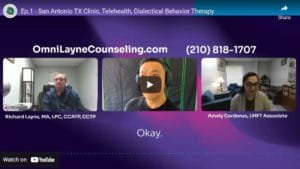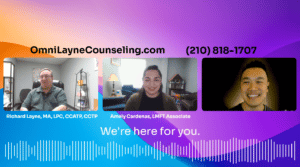Show Notes
[00:00:00] Sherman Hu: Good morning and welcome to another 10 minute therapy podcast powered by OMNI Layne Counseling. I have Amely and I have Richard here with us this morning. How you guys doing?
[00:00:11] Richard Layne: We’re doing great. How about you, Sherman? Okay. I’m doing awesome.
[00:00:14] Sherman Hu: The sun is shining outside. I’m enjoying today. I wanted to piggy back off last week. We touched on anxiety and depression just a little bit. And I wanted to ask you, Amely.
What is anxiety? How is it expressed amongst different clients?
[00:00:27] Sherman Hu: What is anxiety? How is that expressed amongst different clients?
[00:00:32] Amely Cardenas: Oh, man. The biggest one is that nervousness feeling. Sometimes it even shows in irritability. People express heavy breathing, heart racing, and all of that is natural.
[00:00:44] Honestly, we couldn’t be excited for anything… Our natural instinct to surviving, we wouldn’t be able to do that without anxiety.
[00:00:53] There are good anxiety moments, and then there’s moments that we don’t want.
Our natural instinct to surviving, we wouldn’t be able to do that without anxiety. There are good anxiety moments, and then there’s moments that we don’t want.
Amely Cardenas, LMFT Associate
[00:00:57] I picture this kid that’s [00:01:00] getting ready to go to a big trip, whether it’s Disney World, wherever they’re going. And that excitement, they’re so jittery and they’re so excited, they can’t sleep.
[00:01:10] If anxiety wasn’t there, or we think of it as excitement. They wouldn’t care. If we did not have some, a little bit of anxiety here and there, we wouldn’t care.
[00:01:23] And most of the time for people, anxiety looks like they’re hyper-focusing and they’re caring so much about this one thing that’s bothering them.
[00:01:32] And so, we need it. A lot of about anxiety can be very sciency. So the amygdala is a little spot in our brain that sends messages to the rest of your body that lets you know, “Hey, I’m not feeling my best.” Whether it’s anxiousness, that’s probably the biggest one.
“Amy” (Amygdala) & “Flo” (Frontal Lobe)
[00:01:52] Amely Cardenas: The way I describe it to clients is “we have Amy and Flo”.
[00:01:56] Amy is our amygdala. And Amy’s in charge of pulling the [00:02:00] fire alarm to let us know, “Hey, there’s a fire or there’s something going on.”
[00:02:04] And “Flo”, our frontal lobe, she’s in charge of making those decisions like, “Hey, what do we do?” ” Hey, we should do this. We should do that.”
When is “Amy” (amygdala) in charge?
[00:02:13] Amely Cardenas: But when Amy’s in charge and when anxiety’s a little bit out of our comfort zone, and we’re concerned that it’s running our lives, it’s pulling the fire alarm and blocking “Flo” from making any decisions because the amygdala is in charge. Amy’s in charge and she’s just ” We need to fight.” or “Freeze”. Those are our natural instincts.
The way I describe it to clients is “we have Amy and Flo”. Amy is our amygdala. And Amy’s in charge of pulling the fire alarm to let us know, “Hey, there’s a fire or there’s something going on.” And “Flo”, our frontal lobe, she’s in charge of making those decisions like, “Hey, what do we do?” ” Hey, we should do this. We should do that.”
But when Amy’s in charge and when anxiety’s a little bit out of our comfort zone, and we’re concerned that it’s running our lives, it’s pulling the fire alarm and blocking “Flo” from making any decisions because the amygdala is in charge. Amy’s in charge and she’s just ” We need to fight.” or “Freeze”. Those are our natural instincts.
Amely Cardenas, LMFT Associate
[00:02:37] The example a lot of professors of mine would give is if a bear walked into the room. We’re going to either fight, flight, or freeze.
[00:02:46] That’s just a little bit about anxiety. If you want more information about how to manage anxiety, you should definitely make an appointment with us at OMNI Layne Counseling.
[00:02:55] One of our excellent counselors can totally explain more about it in their [00:03:00] own very unique way. This is just one way I explain it.
[00:03:03] Sherman Hu: That’s brilliant. I really like the example of “Amy” and “Flo”. And one is welcome at a time.
[00:03:13] Amely Cardenas: They’re both needed. There’s definitely, we need both pieces of the puzzle to have our brain work. Sometimes we don’t need Amy to take the wheel, we need Flo a little bit more.
[00:03:22] Sherman Hu: I love that example. Let’s pivot over to you, Richard. We did speak a bit about depression last week. And would you share with our audience,
What is depression? How is it expressed?
[00:03:31] Sherman Hu: What is depression? How is it expressed?
[00:03:34] Richard Layne: Before we get into that, please remember everyone. *OMNI Layne Counseling is here for you. If you’re feeling extremely depressed and especially suicidal or homicidal, okay? *
[00:03:47] Just like anxiety, depression is a natural thing that happens to all of us. All of our emotions and feelings are natural. We need them, but we need them on a short-term [00:04:00] basis for the most part.
Just like anxiety, depression is a natural thing that happens to all of us. All of our emotions and feelings are natural. We need them, but we need them on a short-term basis for the most part.
Richard Layne, MA, LPC, CCATP, CCTP
[00:04:01] So for example, with depression, let’s say your grandmother dies, you’re feeling really sad. You’re going through depression because your grandmother just died. That’s a part of grief and we need that.
[00:04:13] However, if we’re seeing someone and they’re saying,
[00:04:17] “I’ve been so depressed, I cannot get out of bed.” “I feel like hurting myself.” “I don’t feel like doing anything for two or more weeks.”
[00:04:26] Now, we’re concerned. Okay? Now we’re talking about maybe potentially long-term counseling and or medications at that point. Okay. So there is definitely a time period involved here and is very important.
The myth in our culture about depression
[00:04:41] Richard Layne: Things that are said in our culture right now that is a myth: Serotonin is the only thing that affects depression.
Things that are said in our culture right now that is a myth: Serotonin is the only thing that affects depression.
Richard Layne, MA, LPC, CCATP, CCTP
4 of hundreds of neurotransmitters in our brain that affect depression
[00:04:48] Richard Layne: We literally have hundreds of neurotransmitters in our brain and right now, I’m only going to talk about four.
[00:04:56] I’m going to talk about serotonin.
[00:04:59] I’m going to talk [00:05:00] about dopamine.
[00:05:00] I’m gonna talk about endorphins, and
[00:05:02] I’m going to talk about oxytocin.
[00:05:04] All four of those directly affect whether you’re depressed or you’re not depressed.
I’m going to talk about serotonin.
I’m going to talk about dopamine.
I’m gonna talk about endorphins, and
I’m going to talk about oxytocin.
All four of those directly affect whether you’re depressed or you’re not depressed.
Richard Layne, MA, LPC, CCATP, CCTP
[00:05:11] What happens in our brain is if the chemicals are flowing correctly in the brain, “Hey, we’re fine. We’re good to go. We’re happy. Yay. We’re going to work.” Whatever’s going on that day. Okay?
[00:05:25] However, If they get to a certain point and he gets stuck there and they go back in the direction they were coming before then we’re starting to feel down.
[00:05:37] Now we’re depressed. Now we don’t necessarily know what to do. And we’re thinking because of all those wonderful drug commercials we’ve seen out there. That there’s something horribly wrong with us.
Culture problem: Thinking long-term depression vs short-term depression
[00:05:49] Richard Layne: And this is a problem in our culture. We hear the word depression, and we don’t think about the short-term depression.
[00:05:56] People are thinking about the long-term depression, where they’re [00:06:00] going, “oh my God, I’m going to kill myself. I’m going to die. I’m crazy.” No, that’s not necessarily true.
“Feel Good Messengers”
[00:06:07] Richard Layne: Counseling can be an extremely important part of all that. And it’s only because certain things are happening. Either those four chemicals in particular are not processing correctly.
[00:06:20] And maybe some others, like for example, cortisol is also implicated in depression.
[00:06:27] All of those are what we call “Feel Good Messengers”. If they’re not correct in our brain, we’re not going to feel right. We don’t feel good.
[00:06:35] Come to OMNI Layne Counseling for our counselors to teach you how to make those chemicals flow correctly in your brain, for you to be on a positive path and not necessarily a negative path all the time. Cause that’s what depression can be like. You just feel like there’s this negative weight around you and it’s pulling you [00:07:00] down and down. You can’t get up. We don’t want that.
[00:07:04] Our counselors here are trained for this type of work and to help you get out of this depressive episodes and move forward. You don’t have to live life in depression.
Come to OMNI Layne Counseling for our counselors to teach you how to make those chemicals flow correctly in your brain, for you to be on a positive path and not necessarily a negative path all the time. Cause that’s what depression can be like. You just feel like there’s this negative weight around you and it’s pulling you down and down. You can’t get up. We don’t want that.
Richard Layne, MA, LPC, CCATP, CCTP
What is “Mindfulness” and how is it helpful?
[00:07:18] Richard Layne: And we’re going to turn this over now to Amely about mindfulness.
[00:07:22] Sherman Hu: Before the show, Amely talked about “Mindfulness“. Would you share with us what that is about and how that can be helpful?
[00:07:30] Amely Cardenas: Mindfulness can be such a great tool, especially when we feel, like what Richard saying, like that negative emotions all around us. Like a heavy blanket that we can’t take off.
[00:07:42] Mindfulness stops racing thoughts or that negative energy and puts us in the moment. Right here in the present.
Mindfulness stops racing thoughts or that negative energy and puts us in the moment. Right here in the present.
Amely Cardenas, LMFT Associate
[00:07:50] Sometimes I’ll do it in session.
[00:07:52] Where are you right now? In my office. We have that nice elephant picture back there. We have this computer here.[00:08:00] _ I have some Legos and a doll house behind me. That’s where we are. _
[00:08:04] We’re not with our anxiety and our depression. Things that have been triggering us are not there.
[00:08:10] With mindfulness it can be a pause button to get us to focus on what’s in front of us right now.
With mindfulness it can be a pause button to get us to focus on what’s in front of us right now.
Amely Cardenas, LMFT Associate
[00:08:16] You can do it while you eat.
[00:08:18] You can do it as a gratitude moment.
[00:08:22] You can do it as meditation, like in yoga.
[00:08:24] Of course, with any type of coping skill that our wonderful counselors can teach you, not everyone’s going to fit the bill, but you can find something that fits you.
[00:08:35] So with mindfulness, wherever you want to do it, in the car, in your room, at work. You can do it.
[00:08:41] One of the great things about our society is we have technology. And I do want to share one app that I recently found. And funny story, I used it to help me fall asleep. Knocked me out and I’m a very, it takes me forever to fall asleep.
[00:08:57] So this isn’t an ad, but it’s [00:09:00] called Smiling Mind and it’s this nice little app. It is free. That was one of my selling points. Okay, I don’t have to subscribe every month to use this product. It’s a 10 to 20 minute audio session, and it can tell you a little bit more about mindfulness and then it can lead you into the practice.
Mindfulness Exercise: Breathing. 5, 4, 3, 2, 1.
[00:09:19] Amely Cardenas: And that’s what I want to do a little snippet today, what it would look like.
[00:09:23] And if you guys don’t mind if we could do it together.
[00:09:26] If you feel comfortable, close your eyes.
[00:09:28] Soften your gaze.
[00:09:30] Let’s take some deep breaths.
[00:09:34] In and out.
[00:09:39] And in. And out.
[00:09:47] Smell the roses
[00:09:52] Blow out the candles.
[00:09:53] And so the mindfulness can also start with deep breathing [00:10:00] and holding it and then breathing out and holding it. It’s very slow.
[00:10:06] It gives you a minute to calm yourself.
[00:10:09] If you have your eyes open, explore the room around you. What are some things that you haven’t noticed because you’re focusing on other things.
[00:10:17] What are five things you see?
[00:10:20] Four things you hear?
[00:10:22] Three things you smell, if you can smell anything?
[00:10:26] Two feelings that you have during this breathing exercise?
[00:10:30] And just one little thing that you learned from this?
[00:10:34] It’s a very calming moment and you can literally can do it for one minute.
[00:10:39] Sherman Hu: Brilliant. That’s brilliant. I could see how somebody could focus on the 5, 4, 3, 2, 1 while breathing and then fall asleep.
[00:10:47] Amely Cardenas: Yeah. Yeah. So with the sleep one that it gets you into a relaxed state of “let’s just focus on our breathing” and, yes, “Squirrel Brain” is going [00:11:00] to happen. And it will say that in the app. “I know maybe your thoughts have drifted. Maybe you’re not focusing on your breathing, but gently bring yourself back.”
Mindfulness is judge-free zone
[00:11:08] Amely Cardenas: Mindfulness is a judge-free zone. It’s a minute to, “I am just going to take a breather.”
[00:11:15] No one is perfect at it. Just our natural ability is to breathe. So it’s just a nice little, very nice and calming.
[00:11:26] Another thing with mindfulness is processing it.
[00:11:30] For me leading it was very different than when I have been a part of it and just listen to the instructor.
[00:11:37] I had to remind myself, “okay, you’re breathing and you need to tell them what to do next.” And so it’s very different than actually practicing it.
[00:11:45] Maybe it’s asking yourself is this process something I want to continue doing? And it’s not, “oh, it was good.” It’s the processes. How did it actually go? Like a descriptive way of the process.
[00:11:59] The first time [00:12:00] I did it, I could not focus. There was someone that was clicking their pen. “I can’t focus,” but that’s something that now I know. If I am going to do some mindfulness practice, I need no sound whatsoever. If you can find a private spot and do your mindfulness, use it.
[00:12:18] If you don’t get distracted very easily, you can do it anywhere. That’s just a little bit about mindfulness.
[00:12:26] Sherman Hu: Thank you so much for introducing “Amy and Flo”. Talking about anxiety. And mindfulness. And the app, and how that could benefit us. And Richard, thank you so much for unpacking depression.
[00:12:38] Would you, Amely, have any final words before we wrap up today’s episode?
[00:12:43] Amely Cardenas: Same thing that Richard said,
[00:12:44] “We are here for you. And you are not alone. All these feelings and emotions you’re having, they are so valid and natural. We wouldn’t be human beings if we didn’t have these emotions. We can use our words and we can express how [00:13:00] we’re feeling. Even though it seems scary we are really here to help. It’s a judge free zone. It’s a judge free zone to be able to express how you’re feeling.”
“We are here for you. And you are not alone. All these feelings and emotions you’re having, they are so valid and natural. We wouldn’t be human beings if we didn’t have these emotions. We can use our words and we can express how we’re feeling. Even though it seems scary we are really here to help. It’s a judge free zone. It’s a judge free zone to be able to express how you’re feeling.”
Amely Cardenas, LMFT Associate
[00:13:10] Sherman Hu: That’s awesome. Richard, any final words before we close out today’s episode?
[00:13:14] Richard Layne: Yes, I’m glad we’re here for everyone that can hear this. Everyone that can access it. My understanding is we’re on TikTok now and YouTube, is that correct?
[00:13:27] Sherman Hu: YouTube, for sure. And TikTok coming up.
[00:13:30] Richard Layne: We’re going to get out to lots and lots of people. My thing has always been, if someone is really struggling, yes. I prefer for them to come into counseling because we’re here for them.
[00:13:41] However they get the information that helps them is the important point.
[00:13:49] We are here for you. Clients are always first at OMNI Layne Counseling.
[00:13:54] Sherman Hu: That’s wonderful. Thank you, Amely. Thank you Richard, for your time this morning, and that wraps up today’s [00:14:00] episode.
[00:14:00] Thank you for joining us. Stay tuned next week, as we bring you another session of the 10 minute therapy podcast by OMNI Layne Counseling.



